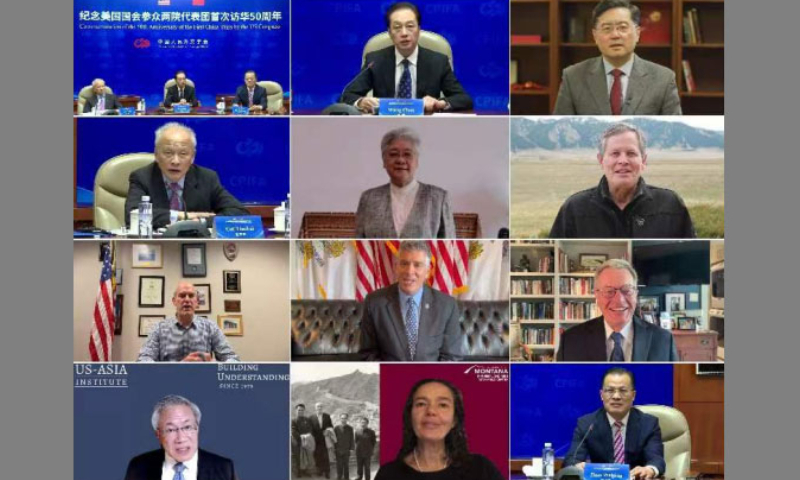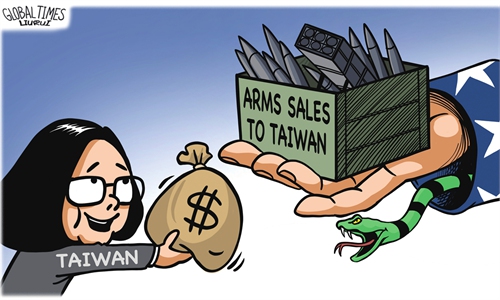Chinese and US politicians call on both sides to jointly push forward bilateral relations

The online Commemoration of the 50th Anniversary of the First China Trips by the US Congress hosted by the Chinese People's Institute of Foreign Affairs (CPIFA) on Wednesday. Photo: The Chinese People's Institute of Foreign Affairs
Diplomats, experts and scholars from both China and the US said on Wednesday that a path should be found to let go of differences and move toward stability and peace, especially at a moment when bilateral relations are most challenging.
The remarks were delivered either in person or via video at the online Commemoration of the 50th Anniversary of the First China Trips by the US Congress hosted by the Chinese People's Institute of Foreign Affairs (CPIFA) on Wednesday.
Attendees included Wang Chao, President of the CPIFA, Qin Gang, Chinese Ambassador to the US, Cui Tiankai, Advisor to the CPIFA Council and former Chinese Ambassador to the US, Darin LaHood, Co-Chair of the US-China Working Group of the US House of Representatives, as well as Max Baucus, Former US Ambassador to China and Former US Senator.
Wang Chao, said in his speech that the visit of a delegation from the US Congress to China 50 years ago opened the history of US Congressional exchanges with China and played an important role in promoting the normalization of China-US relations.
Both the US Senate Majority Leader, Mike Mansfield, and Minority Leader, Hugh Scott, and House Majority Leader, Hale Boggs, and Minority Leader, Gerald Ford, led successive delegations to visit China, shortly after President Nixon's ice-breaking trip to China in 1972.
The delegation visited many Chinese cities and communicated with locals and officials at all levels. They expressed firm support for the development of China-US relations in their reports on the visit to China after returning to the US, Wang said.
"We deeply feel that strengthening contacts and exchanges between the Chinese and American people is vital to the enhancement of mutual understanding and trust," said Wang, expecting to host more US delegations to visit China when the pandemic is over.
Ambassador Qin Gang said that mutual respect, peaceful coexistence and win-win cooperation are the way for China and the US to get along. This was the case 50 years ago and they are still the basic principles for our relations today and in the years ahead.
Qin stressed that China and the US should manage differences and prevent crises as the Taiwan question is the most significant and sensitive issue in China-US relations.
"We hope that the US will honor its political commitment on the Taiwan question over the past 50 years, stop hollowing out the One-China principle, conniving at supporting 'Taiwan independence' and playing the 'Taiwan card' in China-US relations. Only in this way can we truly maintain peace and stability across the Taiwan Straits and avoid major crises between China and the US," Qin emphasized.
Ambassador Cui Tiankai said that, although China-US relations are facing unprecedented challenges and difficulties, the two major countries with different social systems are absolutely able to coexist peacefully and cooperate in a beneficial way as long as both sides respect their differences and the fundamental interests and common aspirations of the people of the two countries.
Advisor Tang Wensheng, working then as the interpreter for the official activities such as the meeting between Premier Zhou Enlai and Senators Mansfield and Scott, recalled the important moments of that historic visit as a witness in her remarks.
Tang expressed admiration for the insights and courage of politicians from both countries and was grateful for their deeds which helped pave the way for the normalization of China-US relations. She also hoped their spirits will remain with us and encourage us to overcome difficulties and go forward courageously.
The guests from the US side expressed in their remarks their support for China-US relations and the exchanges between the US Congress and China.
The participants from the US stressed the importance of China-US relations, saying that dialogue, communications and setting aside differences are important ways to push the two world's leading powers to continue to meet each other halfway, especially at a time when bilateral relations are under pressure and challenges.
More than 100 participants from government, businesses and academia, from China and the US, participated online in the commemorative activities and a short video clip of the First China Trips by the US Congress in 1972 was played during the event.
Global Times

